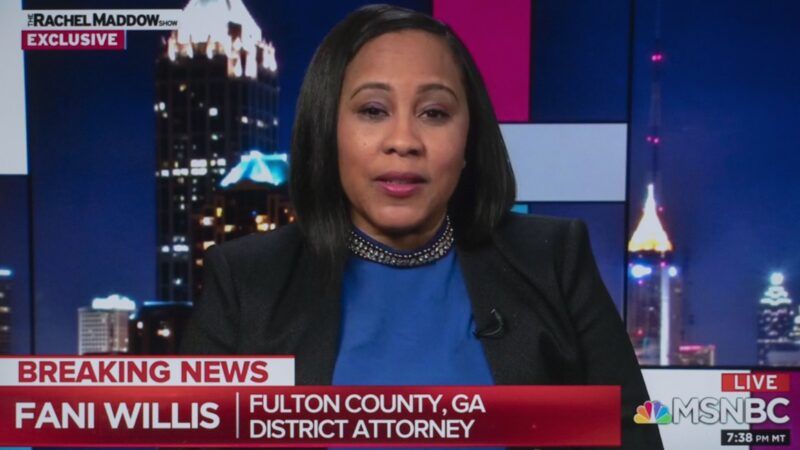If You Support the Death Penalty for Hate-Motivated Murders, You Support the Death Penalty
Georgia D.A. reverses her previous position when faced with a mass shooting she sees as a hate crime.

Fulton County, Georgia, District Attorney Fani Willis has announced her office is pursuing the death penalty against Robert Aaron Long, the 21-year-old man accused of shooting and killing eight people on March 16 at three Atlanta-area massage parlors.
While making the announcement Tuesday, Willis acknowledged that on the campaign trail (she was elected in November) she told voters she "could not imagine a circumstance where [she] would seek [the death penalty]." But she now says she believes Long deserves the "ultimate penalty":
Fulton County District Attorney Fani Willis says she will seek death penalty for the Atlanta spa shootings suspect, despite campaigning on her opposition to it: "Unfortunately, a case has arisen in the first few months of my term that I believe warrants the ultimate penalty" pic.twitter.com/edvxmvcf4F
— CBS News (@CBSNews) May 11, 2021
This reversal is tied to Willis' decision to pursue the case against Long as a hate crime. Georgia passed a law in 2020 that allow prosecutors to seek enhanced penalties against those who target victims based on their perceived race, color, religion, national origin, sex, sexual orientation, gender, mental disability, or physical disability.
Six of the eight victims of Long's shootings were Asian women, and media speculation around the time of the incident focused on whether race played a role in Long's targeting. After his arrest, Long blamed a sex addiction, and said he had previously sought help at an evangelical treatment center. He had also been a customer at two of the massage parlors.
Once we start talking about hate crime enhancements, then we actually have no choice but to analyze why Long killed these people. Long clearly developed a twisted focus on sexual purity, and the targeting of these women seems based more on his attitude toward himself, not his attitude toward their ethnicity. This is not a justification, it's simply a necessary thing to talk about when we talk about hate crimes.
As for Willis, it's hard not to listen to her justification and think that the only unimaginable "circumstance" here is the entirely imaginable and understandable public outrage over a mass shooting. Does the ethnicity of his victims, or the extent of public outrage, make Long any more deserving of execution than any other murderer?
Willis is a member of the Democratic Party, and the platform her party adopted when Biden was nominated for president calls for completely abolishing the death penalty. Of course, the national platform is not the same as a state party's platform (Georgia's does not mention the death penalty), and not every Democratic elected official is obligated to agree with the national or state party platform. That said, Willis made no exception for hate crimes when she declared her opposition to the death penalty in 2020.
When President Donald Trump's administration fired up the federal death chamber again in 2020, the very first man executed, Daniel Davis Lee, was a white supremacist who brutally killed an Arkansas family to seize their weapons and money to fund the formation of a white ethno-state up in the Pacific northwest. The murders wouldn't be considered a hate crime even today, because the victims were white and their deaths were the result of a robbery gone wrong. But his actions were still motivated by racism, and criminal justice reformers nevertheless criticized Trump and his administration for reinstating the federal death penalty and executing 13 people in the final months of his presidency. What makes Willis' decision different or better than those made by Trump and former Attorney General Bill Barr?
When Willis makes a death penalty exception for a hate crime, what she's signaling is that she actually is a supporter of this form of punishment, and furthermore, she believes it should be applied in response not to the needs of justice, but to cultural and political pressures that result from a high-profile incident. That is actually the opposite of justice.


Show Comments (92)